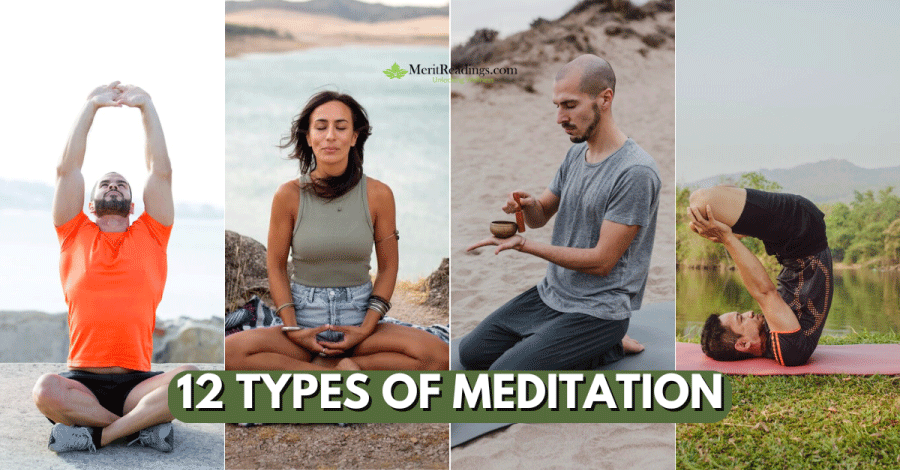Meditation is a time-tested practice that enhances mental clarity and physical well-being. People have used it for centuries to find inner peace and balance, offering a break from hectic lives. Meditation helps you relax, focus, and recharge. This guide introduces 12 different types of meditation, each with unique benefits and practices.
Understanding different forms of meditation helps you unlock their full potential. Regular practice can reduce stress and anxiety, improve sleep quality, and boost your immune system. Exploring various techniques allows you to find one that suits your lifestyle and enhances your mental and physical health. Join us as we explore the diverse world of meditation practices and discover the path to greater well-being.
The Overall Health Benefits of Meditation
Meditation offers numerous health benefits:

- Reduces stress and anxiety
- Enhances emotional regulation
- Sharpens focus and concentration
- Reduces pain
- Improves sleep quality
- Boosts immune function
- Lowers blood pressure
Read Full Guide: The Incredible Benefits of Morning Meditation
Types of Meditation

There are many types of meditation, each with specific benefits and practices. Here, we will discuss twelve popular forms.
- Mindfulness Meditation
Mindfulness meditation comes from Buddhist traditions. It focuses on being present in the moment. The benefits include reduced stress and improved focus. To practice, sit quietly and pay attention to your breath. Notice your thoughts without judgment.
- Guided Meditation
Guided meditation involves listening to a guide who leads you through the practice. It is perfect for beginners. Apps like Headspace offer guided sessions. You follow recorded instructions to relax and meditate.
- Mantra Meditation
Mantra meditation involves repeating a word or phrase. This helps improve concentration and relaxation. You can practice by silently repeating a mantra, such as “peace” or “om,” during your meditation session.
- Transcendental Meditation
Transcendental Meditation (TM) uses a personal mantra. It provides stress relief and enhanced awareness. Learning TM requires instruction from a certified teacher. Once learned, you use your mantra to meditate for 20 minutes twice a day.
- Loving-Kindness Meditation (Metta)
Loving-kindness meditation focuses on cultivating compassion and kindness. During practice, you repeat phrases of goodwill towards yourself and others. This meditation helps increase feelings of love and empathy.
- Vipassana Meditation
Vipassana, or insight meditation, has ancient roots. It promotes spiritual growth and self-awareness. Practicing Vipassana involves observing your thoughts and sensations without reacting to them.
- Chakra Meditation
Chakra meditation focuses on the body’s energy centers. Balancing these chakras can enhance overall well-being. During practice, focus on each chakra, visualizing it and feeling its energy.
- Breath Awareness Meditation
Breath awareness meditation is simple but powerful. It involves focusing on your breath to relax and become mindful. Observe the rhythm of your natural breath without trying to change it.
- Movement Meditation
Movement meditation includes practices like Tai Chi and walking meditation. These meditations combine mindfulness with physical activity. Focus on bodily sensations as you move, helping to keep your mind calm and present.
- Visualization Meditation
Visualization meditation uses mental imagery to relax and achieve goals. You can imagine peaceful scenes or visualize personal success. This practice helps reduce stress and increase motivation.
- Focused Meditation
Focused meditation enhances concentration by allowing one to focus on a single object or sensation. For example, one might concentrate on a candle flame or a specific sound. This practice improves one’s ability to maintain attention.
- Spiritual Meditation
Spiritual meditation connects you to your faith or spirituality. It often involves prayer, chanting, or contemplating sacred texts. This type of meditation deepens spiritual connections and provides inner peace.
Some Other Mediation Types.
- Progressive Muscle Relaxation (PMR)
Progressive Muscle Relaxation (PMR) focuses on releasing physical tension. You practice by tensing and then relaxing different muscle groups in your body. This helps reduce stress and promote relaxation.
- Mindfulness-Based Stress Reduction (MBSR)
Mindfulness-Based Stress Reduction (MBSR) is a structured program that combines mindfulness meditation and yoga. It helps reduce stress and improve emotional regulation.
Quick Comparison of Meditation Types
Here is a quick comparison of the different types to help you choose the meditation practice that best suits your needs. This table summarizes key aspects such as benefits, focus areas, and who each type is best suited for.
| Meditation Type | Key Benefits | Practice Focus | Best For |
| Mindfulness Meditation | Stress reduction, improved focus, emotional balance | Present-moment awareness, breath awareness | General stress relief and enhanced focus |
| Guided Meditation | Relaxation, clarity, stress relief | Following instructions from a guide | Beginners and those needing structured guidance |
| Mantra Meditation | Improved concentration, relaxation | Repetition of a mantra | Enhancing focus and achieving relaxation |
| Transcendental Meditation | Stress relief, enhanced awareness | Repeating a personal mantra | Deep relaxation and heightened awareness |
| Loving-Kindness Meditation (Metta) | Increased empathy, emotional warmth | Repeating phrases of goodwill | Developing compassion and kindness |
| Vipassana Meditation | Spiritual growth, self-awareness | Observing without judgment | Deep spiritual insight and personal growth |
| Chakra Meditation | Enhanced well-being, energy balance | Concentration on different chakras | Balancing energy and improving wellness |
| Breath Awareness Meditation | Relaxation, improved mindfulness | Observing natural breath rhythm | Stress reduction and mindfulness |
| Movement Meditation | Mindfulness, physical activity | Movement with focus on bodily sensations | Integrating physical activity with mindfulness |
| Visualization Meditation | Goal achievement, relaxation | Imagining peaceful scenes or personal goals | Achieving specific goals and relaxation |
| Focused Meditation | Enhanced concentration, clarity | Maintaining attention on a single point | Improving focus and concentration |
| Spiritual Meditation | Deepened spiritual connection, inner peace | Prayer, chanting, or contemplation of spiritual texts | Deepening spiritual understanding and inner peace |
| Progressive Muscle Relaxation (PMR) and Mindfulness-Based Stress Reduction (MBSR) | Stress reduction, emotional regulation | Tensing and relaxing muscles (PMR); mindfulness and yoga (MBSR) | Comprehensive stress management and relaxation |
6 Simple Steps to Start Practicing Meditation
Finding the right meditation practice is just the beginning. Here’s how to get started with your chosen method:
- Find a Quiet Space: Choose a calm, quiet place where you won’t be disturbed. This helps you focus better and relax.
- Set a Time Limit: Start with just 5 to 10 minutes. As you become more comfortable with meditating, gradually increase the time.
- Get Comfortable: Sit or lie down in a comfortable position. You can use a chair, cushion, or the floor—whatever feels best for you.
- Focus on Your Breath: Pay attention to your breathing. Breathe in deeply and exhale slowly. Notice the rhythm of your breath.
- Acknowledge Distractions: If your mind starts to wander, gently bring your focus back to your breath. It’s normal to have distractions.
- Be Patient and Consistent: Practice regularly to build a habit. With time, meditation will become easier and more beneficial.
Tips to Improve Meditation
- Set a Routine: Establish a regular time for meditation to build a consistent practice.
- Create a Dedicated Meditation Space: Designate a quiet, comfortable area for your practice.
- Minimize Distractions: Turn off notifications and create a peaceful environment.
- Ensure Comfort in Posture: Sit in a comfortable position that supports relaxation.
- Use Meditation Apps or Guided Sessions: Apps and guided sessions can provide structure and support.
- Redirect Wandering Thoughts: When your mind wanders, gently guide it back to your focus.
- Celebrate Small Wins: Acknowledge and appreciate your progress.
- Practice Patience: Meditation is a skill that develops over time. Be patient with yourself.
Conclusion
Exploring the twelve types of meditation reveals a wealth of opportunities for personal growth and well-being. Each practice, like Mindfulness, Loving Kindness, or Transcendental Meditation, provides unique benefits. They can help you manage stress, improve focus, and find inner peace. Finding the right meditation style for you can transform your life, bringing balance and tranquillity to your everyday routine.
Regular meditation fosters long-term benefits, from improved emotional regulation to better physical health. By adding meditation into your daily life, you commit to a journey of self-discovery and continuous improvement. Explore the meditation practices in this guide and make them a regular part of your routine for a healthy and happy life.
FAQS
How Long Does Meditation Take to Work?
Some benefits of meditation, like relaxation, can be felt immediately. However, long-term changes, such as improved focus and reduced anxiety, come with consistent practice.
How Often to Meditate
Aim to meditate daily. Experiment with different times of the day to see what works best for you.
What Happens When You Stop Meditating?
Stopping meditation may cause the gradual loss of benefits. Consistency is key to maintaining the positive effects of meditation.



